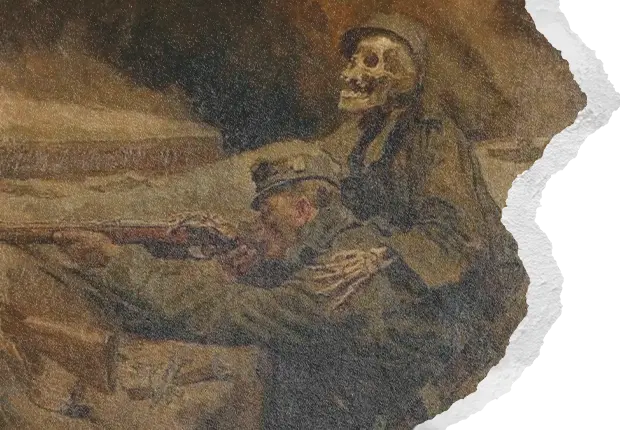Horror
Horror belongs, as well, to the circle of feelings that from old rests in our depths, bursting forth with primal energy in the shock of violent force. Its dark sway seldom flits about the high star of Modernity.
For prehistoric man it was a more constant, invisible companion on his wanderings through the immensity of the barren steppes. In thunder and lightning, it appeared to him at night and cast him down with its suffocating grip – him, our forefather who stood against all the powers of the earth with a feeble stone in his fist. And yet precisely this instant of utter impotence elevated him above the beast. For a beast can indeed feel fright when a threat suddenly emerges; he can sense fear when hunted and cornered; horror, however, is foreign to him. It is the first lightning burst of reason.
It is also closely related to voluptuousness, to the intoxication of blood, and the pleasure of play. As children, didn’t we all listen to scary stories on long winter nights? Every fiber trembled and you would have liked to hole yourself up safely in a den – but still couldn’t get enough. It was as if you had strayed off into the muck and mire and happened upon a nest of speckled serpents from which you couldn’t escape, the pleasure of seeing their hideous coils being too great.
In areas where people pursue a life of stimulation, horrific spectacles garishly painted on canvas beckon at every carnival and fairground. Murders of passion, executions, wax figures pocked with purulent ulcers, row upon row of anatomical abominations: staging such a bill for the audience guarantees you will fill your pockets. Frequently, I stood long hours in front of such stalls and stared in the faces of those leaving. There was almost always a smile and note so strangely misplaced and constrained. What was this smile supposed to hide? And why was I standing there? Wasn’t horror also delightful for me? The pleasure of children and the masses is foreign to no one.
Like a child in the servant’s kitchen or a farmhand in a cabinet of horrors, young volunteers crouch in the barracks hall, huddled around a veteran in whose voice the horrors of the battlefield still trembled. Despite their pale faces and darkened eyes, there was scarcely any who did not long ever more passionately for the day of deployment. Though it might even mean silencing his beating heart, each man was driven to stare the gorgon in the face.
And the hour came for everyone, bubbling up darkly from indeterminate depths, precisely when it was least expected. When the fields were fallow like on important holidays – and yet, completely different. When blood coursed through head and heart as before a passionate rendezvous – but even hotter and more amazing. When inching ahead closer and closer to the roaring din, the strikes blaring louder, the hunt ever more hurried. When the fields glowed from a glut of agitated thoughts all around. When so overcome with emotion, landscape and actions emerged only later dark and dream-like from memory. The baptism of fire! There the air was so laden with overflowing virility – that every breath was intoxicating, that you wanted to cry without knowing why. To be able to experience it – oh manly hearts!
Then the column extended like a bat in flight and the laughing and shouting died down. Along the way, there lay to the side someone stiff and wooden with a sharp, wax-yellow face whose glassy eyes stared into the void. The first dead – that unforgettable moment freezing blood to brittle ice crystals. Like a pale and dreadful nag before the nocturnal abyss, horror reared up in each of us, imprinting another impression into our brains for all time: to one, the hand like a claw pounded into the moss and earth; to another, bluish lips against white teeth; to a third, the blood-black crust of the hair. Ah, prepared as you may be for this instant, all is shattered by the horrific figure in the ditch, upon whose dirty face the first blue flies already danced. This figure, and the countless that followed, appeared over and over in their thousand contorted forms, with lacerated bodies and gaping skulls. Pale admonishing spirits to the mad trench diggers in the minutes before the storm, until the liberating cry to attack rang out.
Horror is inextricably bound up with death in our imagination. We are as unable to separate the two as prehistoric man was incapable of separating the horror felt, from the streak of lightning that blazed to earth nearby. Will future generations conquer this horror, and with the same tender feelings think back on us – on us and the shudder of feelings in our breast as we the meander through endless wastelands to the frontlines?
On these nightly forays through the undulating wastes, your heart was so lonely and orphaned, as though it were a pendulum swinging over the deathly shimmer of frozen seas. All warmth was sapped by the lurking inexorability all around. Countless times the wailing howls of someone slowly dying trailed off into the void. Further, just a little further to the safety of the burrow!
Although you strode the trampled, scar-pocked fields for years, still time and again you were jolted awake as from mad and terrible dreams. Where were you? On some lunar crater-scape? Expelled into the depths of an inferno? Enveloped on all sides with golden flames, this infernal dance hall of death was no terrestrial landscape. In that place, no comforting light flickered from the hearth; only gaudy signs of devastation flashed from foxholes as a fiery prelude to crushing savagery. No shrub, not even the tiniest stalk troubled your stumbling steps. Ashen fog and poisonous gas engulfed islands of sorrowful trees – black, shattered stumps. At times a house emerged, abandoned and collapsed like wreckage on the seafloor. What was it that groped with slimy tentacles in faint light from every recess for your heart? The horror of death and decomposition.
Decomposition. Without cross and mound, how much of one dissolves in rain, sun, and wind. Thick clouds of flies swarm, a suffocating mist of vapors hangs about the solitary body. The smell of a decomposing man is unmistakable: heavy, cloying, with a repugnance that lasts like stale bread. After great battles, it lingered so heavily that even the hungriest forgot to eat.
Often a patrol of soldiers survived doggedly for countless days in the fog of battle in some forgotten section of trench or tunnel, like those marooned in a hurricane clinging to a broken mast. In their midst, death had driven its flag into the ground. A field of corpses lay before them: mowed down by iron, near and between them the bodies of their comrades with death itself in eyes set strangely rigid in hollow faces – faces strangely reminiscent of the ghastly realism of old crucifixion images. Almost completely spent, the corpses huddled in unspeakable decay until finally one of the patrol awoke death and its rigid dance began again, sending bodies hurling high into the air.
What did it help that they covered those nearby with sand and chalk or threw a tarp over them to avoid the constant stare from black, bloated faces. There were simply too many: everywhere the spade struck something buried. Every secret of the grave laid open in an abomination compared to which the most fantastical dreams paled. Bushels of hair fell from skulls like withering leaves from autumnal trees. Some dissolved into a greenish, flaky flesh that glowed at night through torn uniforms. Stepping on them, a foot left behind phosphoric treads. Others were dried into calcareous mummies, slowly coming undone. For still others, flesh flowed as a red-brown gelatin from their bones. On humid nights, swollen cadavers awoke to a spectral life as pent up gas escaped, hissing and sputtering from their wounds. Most frightful, however, was the seething rustle that came from them, produced solely by innumerable worms.
Should I go easy on your nerves? Did we not ourselves once lie four days in a trench between corpses? Were not all those there, dead and living, covered in a thick carpet of blue-black flies? Is there something still more extreme? Yes: there lay dead many with whom we had shared all those night watches, all those bottles of wine, all those morsels of bread. Who may speak of war who did not stand among us, in our circle?
After such days, the very sight of the front soldier tramping through hinterland cities in gray, sullen columns, hunched and ragged, ended the mindless bustle of these carefree country folk. “Like from a casket,” whispered one of them to his girl, and everyone trembled who met the emptiness of their deathly eyes. These men were drenched in horror; they would be lost without intoxication. Who may make that determination? Only a poet – a poète maudit in the voluptuous hellscape of his dreams.
And say if any torture still exists
For this old soulless corpse, dead with the dead?
(‘Le mort joyeux,’ Charles Baudelaire)
Accessible to only the most perceptive in its subtle emanations, pervasive horror consists in a contrast embodied where life and annihilation meet, rending asunder. It flows from devastation, terrifying in its apparently insane pointlessness.
Flooded by white moonlight, deserted villages gaped in the night like desecrated tombs, reeking from the fumes of rotten carcasses. Silently, the grass-covered streets flowing with packs of rats. Hesitantly, you circled around fertile farmyards, anxiously uncertain, when suddenly you came across the peaceful spirits of those displaced. Couldn’t the abbé pop up from behind the ruins of the parsonage? What might the darkness of the cellar conceal? The corpse of a girl with stringy hair floating in dark groundwater? In the stables, animal cadavers hung still chained to the charred beams. In the bombed gateway, a doll lay like a tiny corpse.
You swept past the gruesomeness with hobnailed boots, accustomed to blood and iron. And yet like some object laid before a lifeless fireplace, although tightly clothed to the neck you felt so icy that you had to gulp. You were indeed a bearer of war, cavalier and venturesome. You put many under, stepping over them with powerful emotions in your breast. Still the feeling was like a baby’s cry upon wild moors – a ghostly dirge like bells pealing over sea and midday in sunken Vineta. As with the fall of that rollicking city, one sensed the hopeless sinking of a culture, trembling from the knowledge of being sucked into the maelstrom along with it.
Between laughter and madness, there is often little more than the edge of a blade. Once at the start of an offensive, I walked through a city from which the people had saved only their bare essentials. A companion tapped me smiling and pointed to a house whose roof and walls were already cracked and compromised. A shop window had remained eerily clear in the middle of the onsetting destruction. A slew of women’s hats had been stored away. A few days before, while searching for a fallen friend in the late evening of a battle, I had pulled apart the bodies of a group of corpses. Suddenly, a fattened rat leaped towards me from a torn skirt. However, this experience had not shook me as much as the phantasmal contrast between the deserted streets and the shimmering tinsel of painted straw, silk, and colorful feathers, which reminded me of feminine hands and a thousand other trivialities that made our former life colorful.
Another time, together with an old warrior during endless night watches in a darkened nook of a defensive barrier, I asked him in hushed tones about his most horrific experience. His cigarette glowed in quick intervals, his fleshless face casting a reddish sheen. He spoke:
“At the beginning of the war, we stormed a house that had been a business. We forced our way into the barricaded cellar and wrestled in the dark with beastly ferocity while above us the house was already ablaze. Suddenly – in fact ignited by the fire’s fervor – the automatic playing of an orchestrion [a mechanical organ] went off overhead. I will never forget how the carefree clang of dance music accompanied the roar of the warriors and the death rattle of the dying.”
Much more could be told: of men who screamed and laughed long after a shot had shattered their skull; of one who in a winter battle ripped the uniform from his body and, grinning, raced over the bloody fields of snow; of the satanic humor of the great infirmary and much else. Yet, children of the age, we have grown weary of naked facts. So weary.
Not even facts, precisely rather the uncertain, the ineffable, the dull foreboding which sometimes smolders like smoke from a hidden fire aboard a ship. Perhaps everything is just a phantasm. And yet it was so palpable, so lead-heavy on the mind, as an abandoned troop of soldiers crossed through unknown lands under the vaulting night, booming near and far from the immense impact of iron. Then suddenly, a jet of fire tears open the earth in their midst – a cry of concussive knowledge propelled into the infinite. The dim curtain of horror wanted to sweep the mind aloft in a final fire; what sat in waiting behind it, however, the rigid-mouthed survivors were no longer able to say.

































